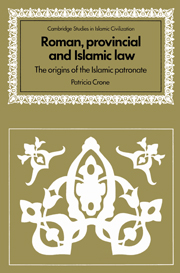4 - The case against Arabia
Published online by Cambridge University Press: 16 October 2009
Summary
I shall now try to show that there was no institution similar to Islamic walā' in pre-Islamic Arabia; more precisely, I shall try to demonstrate that four diagnostic features of the Islamic institution were unknown to the homeland of the conquerors, these being the following:
The Islamic patronate is individual. It binds one person to another in a relationship of dependence. In pre-Islamic Arabia dependent relationships were formed between groups, or between individuals and groups, not between individuals. In short, in pre-Islamic Arabia such relationships were collective.
The Islamic patronate detaches the client from his natal group and incorporates him in that of the patron as a passive member. The Berber client is no longer a member of his Berber tribe, but nor is he a full member of an Arab one. It could be argued that it is enslavement and conversion which detach the client from his kin rather than the institution of walā' itself: the contractual client who remains an infidel presumably remains a member of his natal group as well. But it is to the patron that the latter's group that even the free, unconverted client belongs for purposes of life in Muslim society, and his dependant status in this society arises from the fact that his membership of the patron's group is partial: the patron and his agnates acquire rights and duties vis-à-vis him, but he typically acquires none vis-à-vis them. Individual ties of clientage do not always affect group affiliation, and collective ones never do. Where clientage is collective, the client remains a full member of his own inferior group, as opposed to becoming a partial member of a superior one. Collective clientage creates satellite groups, not semi-members.
[…]
- Type
- Chapter
- Information
- Roman, Provincial and Islamic LawThe Origins of the Islamic Patronate, pp. 43 - 63Publisher: Cambridge University PressPrint publication year: 1987



